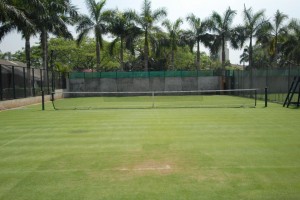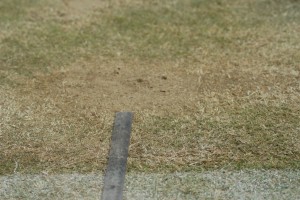By Randy Walker, @TennisPublisher
Buried in this past weekend’s Davis Cup excitement from the heroics of Serbian journeyman Ilija Bozoljac, an injured world No. 1 Novak Djokovic and an improbable 0-2 comeback win from an unheralded British team over Russia was the controversial ending to the Pakistan-New Zealand Davis Cup Group II match.
 The Pakistan Tennis Federation and its star player Aisam Ul-Haq Qureshi are in the process of a full-on campaign for the International Tennis Federation, the organizers of the Davis Cup competition, to overturn a decision by its referee to award the match victory to New Zealand on the account that the court organized by the Pakistani Tennis Federation was not suitable for play. Pakistan was on the verge of posting a 2-0 first-day lead in the best-of-five-match series when the ITF referee called the match in favor of New Zealand due to its perception of the court conditions.
The Pakistan Tennis Federation and its star player Aisam Ul-Haq Qureshi are in the process of a full-on campaign for the International Tennis Federation, the organizers of the Davis Cup competition, to overturn a decision by its referee to award the match victory to New Zealand on the account that the court organized by the Pakistani Tennis Federation was not suitable for play. Pakistan was on the verge of posting a 2-0 first-day lead in the best-of-five-match series when the ITF referee called the match in favor of New Zealand due to its perception of the court conditions.
Due to security concerns in Pakistan, the ITF dictated that the Pakistanis would have to play the series at a neutral venue. A grass court at the Pun Hlaing Golf and Country Club in Yangon, Myanmar was selected by the Pakistani Tennis Federation and approved for play by the ITF.
However, after Pakistan’s Ageel Khan beat New Zealand’s Artem Sitak 7-5, 3-6, 6-2, 7-5 and Qureshi lead Daniel King Turner 6-2, 3-6, 3-0 on the opening day of the series, the on-site ITF-selected neutral referee Asitha Attygalla deemed that a hole in the back of the grass court, described as being an inch deep and six inches wide, was endangering players and ruled that Pakistan would have to forfeit the tie immediately for not providing a playable court.
Attygalla did not allow for a delay in play, by hours or even a day, to repair the court, choosing to immediately award the match to New Zealand by a 4-1 margin.

“It has been a rough court from day one, concerns which we voiced,” New Zealand captain Alistair Hunt told Radio Sport as reported by Reuters. “The court only lasted about a match and a half before a reasonably good hole opened up on the baseline, which proved too dangerous to play on and the referee has called it.”
Pakistan Tennis Federation (PTF) President Kaleem Imam said to Reuters that Attygalla’s decision was a “disaster” and said, “Our manager said the players were very distraught after the referee’s decision. We spent thousands of dollars on preparing for this tie and sending a full-fledged squad to Yangon. We were desperate to win this tie and confident we could do it. We had no option but to complain to the ITF (International Tennis Federation) after the referee awarded the entire tie to New Zealand claiming the playing surface was dangerous.”
Local observers called Attygalla’s decision “shocking” and deemed the decision was an over-reaction as the court was repaired shortly after the match was awarded to New Zealand.
According to Reuters, Pakistan have been forced to host many international sporting matches at neutral venues as foreign teams have refused to travel to the country after eight Pakistanis were killed following an attack on the Sri Lanka cricket team in March 2009. Attygalla, the neutral referee, is also a native of Sri Lanka and resides in Australia.
Qureshi, who won the doubles title at the recent Sony Open in Miami, plans to fly to London to meet with the ITF’s Davis Cup Committee and directly plead the case of his team and suggest that the two teams resume and complete the match at the club at Roehampton, England, within the shadow of the ITF’s headquarters. A group of Pakistani tennis supporters have set up a Facebook page here: https://www.facebook.com/
Qureshi is one of the most respected players on the ATP Tour and gained international recognition when as a Muslim from Pakistan, he partnered with Amir Hadad, a Jew from Israel, at Wimbledon and the US Open in 2002. Their partnership received much international media attention and their photo appeared as the lead, above-the-fold image on the front page of The New York Times during the US Open, where they reached the third round. He was also placed in the spotlight in 2010 when he partnered and reached the US Open doubles final with Rohan Bopanna, a leading player from India, a nation with political differences with that of Qureshi’s Pakistan. Shortly after his US Open success (he also reached the mixed doubles final) Qureshi founded his non-profit foundation (www.StopWarStartTennis.org), created with the purpose of bringing hope through tennis to all those affected by war, sectarian conflict and landmines/unexploded ordinance.
Qureshi is a two-time winner of the ATP World Tour’s Arthur Ashe Humanitarian of the Year award (in 2002 with Hadad and 2010 with Bopanna) and in 2010 he was named a goodwill ambassador to the United Nations Development Program. In 2010, he was awarded the “Sitara-i-Imtiaz” (Star of Excellence) by the Government of Pakistan and also was given the Pakistan President’s Award for Performance in 2002, the Salam Pakistan Youth Award by the President of Pakistan in 2007 and, in 2003, he was a finalist for the Anne Frank Award For Moral Courage presented by the Anne Frank Trust.
His ebook STOP WAR, START TENNIS: LESSONS OF LIFE AND UNDERSTANDING FROM A PAKISTANI TENNIS PLAYER, (available for $4.99 in the United States here: http://www.amazon.com/
